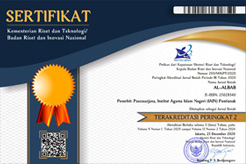PARCUKU: A RELIGIOUS RITUAL OF THE FAK-FAK COMMUNITY
Abstract
Keywords: Parcuku, religion, ritual, community, Fak-fak
Full Text:
PDFReferences
Ahimsa Heddy Shri-Putra. 2012. Paradigma Epistemologi dan Methode Ilmu Sosial Budaya: Sebuah Pemetaan. Unpublihed paper presented at pelatihan methodologi penelitian by CRCS-UGM di Yogyakarta, 12 February 2007.
Abdullah al-Mahlauth bin Sami. 2012. Atlas Agama-Agama, Jakarta: Almahira.
Bahri Media Zainul. 2011. Satu Tuhan Banyak Agama, Pandangan Sufistik ibn ‘Arabi, Rumi dan Al-Jili. Jakarta: Mizan Publika.
Creswell, John W. 2010. Research Design: Pendekatan Kualitatif, Kuantitatif, dan Mixed, Yogyakarta: Pustaka Pelajar.
Dhafamony Mariasusai. 1995. Fenomenologi Agama. Yogyakarta: Kanisius
Esposito John L. 2010. Masa Depan Islam: Antara Tantangan Kemajemukan dan Benturan Dengan Barat. Jakarta: Mizan.
Gazalba Sidi. 1976. Masyarakat Islam:Pengantar Sosiologi dan Sosiografi. Jakarta: Bulan Bintang.
Kutha Ratna Nyoman. 2010. Metodologi Penelitian, Kajian Budaya dan Ilmu Sosial Humaniora Pada Umumnya. Yogyakarta: Pustaka Pelajar.
Koentjaraningrat. 1997. Kebudayaan, Mentalitas dan Pembangunan, Jakarta: Gramedia.
Levi-Strauss Claude. 1997. Mitos, Dukun & Sihir. Kanisius: Jogjakarta.
Sawaun A. 2012. Buku Induk Terlengkap Agama Islam. Jogjakarta: Citra Risalah.
Sunyoto Agus. 2011. Sufi “ndeso” VS Wahabi Kota: Sebuah Kisah Perseteruan Tradisi Islam Nusantara. Jakarta: Noura books.
Suhardi. 2010. Ritual: Pencarian Jalan Keselamatan Tataran Agama dan masyarakat Perspektif Antropologi. Unpublished paper presented as the inauguration of Guru Besar Antropologi at Fakultas Ilmu Budaya Universitas Gadjah Mada.
Su’ud Abu. 2001. Ritus Ritus Kebatinan. Surakarta: Muahammadiyah University Press.
Winangun Wartaya. 1990. Masyarakat Bebas Struktur. Yogyakarta: Kanisius
Article Metrics
 Abstract views: 2286
Abstract views: 2286
 PDF views: 1181
PDF views: 1181











